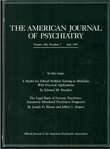Prediction of relapse with the TRH test and prophylactic amitriptyline in 39 patients with endogenous depression
Abstract
The authors conducted a double-blind prospective study of 39 patients with unipolar endogenous depression who recovered after ECT. Thyrotropin (TSH)-releasing hormone (TRH) tests were performed before and after ECT. Patients were divided into three groups on the basis of their altered TSH response: Persistent remission was predicted for patients in group 1 (N = 15) and relapse was predicted for groups 2A (N = 13) and 2B (N = 11). Patients in groups 1 and 2A received placebo and those in group 2B received amitriptyline for 6 months. Fewer relapses occurred in groups 1 and 2B than in group 2A (p less than .05), showing that relapse can be predicted by the TRH test and prevented by amitriptyline.
Access content
To read the fulltext, please use one of the options below to sign in or purchase access.- Personal login
- Institutional Login
- Sign in via OpenAthens
- Register for access
-
Please login/register if you wish to pair your device and check access availability.
Not a subscriber?
PsychiatryOnline subscription options offer access to the DSM-5 library, books, journals, CME, and patient resources. This all-in-one virtual library provides psychiatrists and mental health professionals with key resources for diagnosis, treatment, research, and professional development.
Need more help? PsychiatryOnline Customer Service may be reached by emailing [email protected] or by calling 800-368-5777 (in the U.S.) or 703-907-7322 (outside the U.S.).



